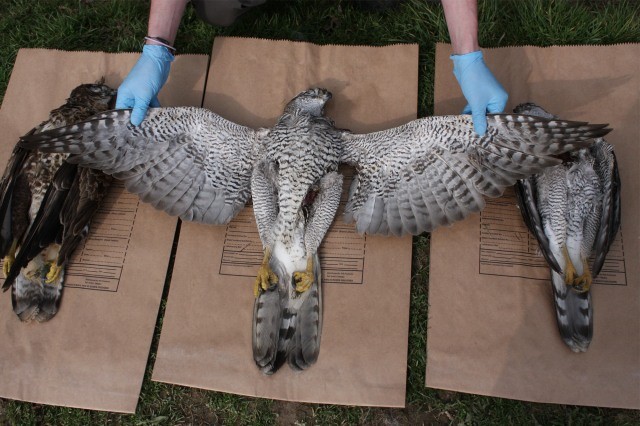Outrage over poisoning of rare birds of prey in Devon
Devon and Cornwall Police and the RSPB are appealing for information after four Goshawks and one Buzzard were found dead in woodland to the west of Exeter. The RSPB is offering a reward of £1000 for information leading to a conviction. The RSPB was informed of the incident by a member of the public and recovered the birds in liaison with the police and the Forestry Commission who own the land.

One of the poisoned Goshawks (RSPB).
The birds, which showed no signs of being shot, were sent for toxicological analysis where it was discovered they had been poisoned with the banned pesticide carbofuran. This substance has been identified in a number of other bird of prey poisoning incidents. In the UK there are only 410 pairs of nesting Goshawks; in Devon the most recent surveys suggest no more than 20 pairs breeding in the county.
PC Josh Marshall, Wildlife Crime Officer with Devon and Cornwall Police, said: "These four Goshawks represent a significant percentage of the Devon population and it's a huge setback for what is a magnificent bird. This is the worst single incident I've dealt with since becoming Wildlife Crime Officer. We rely on the public to be our eyes and ears in wildlife crimes such as this so if anyone knows anything about this, please get in touch."
All birds of prey are fully protected under the Wildlife and Countryside Act 1981 (as amended). In addition, Goshawks are specially protected and listed under Schedule 1 of the Act.

The poisoned birds (RSPB).
RSPB Investigations Officer Mark Thomas said: "This is truly shocking. To find just one dead Goshawk in these circumstances is dreadful, but to find four and a Buzzard is unprecedented, especially when you consider that they have been deliberately lured to their deaths. We hope that the reward will encourage anyone with information to come forward."
The birds were found on Forestry Commission land. Ian Parsons, Forestry Commission ranger for the area, said: "The people that do this to our wildlife not only deprive people of the chance to see these rare birds but they also put the public at risk. The poison involved is lethal to dogs and humans and the land where this happened is open to the public. These people obviously don't care about the dangers of doing this."
If members of the public have information about this crime they can call Crimestoppers on 0800 555 111 or email PC Josh Marshall directly on Joshua.marshall2@devonandcornwall.pnn.police.uk. This will be handled in strictest confidence.

